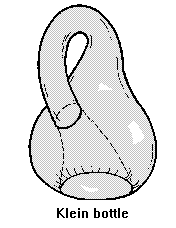Things as They Are
Anias Nin said:We don't see things as they are, we see them as we are.
... and I concur.
The difficulty brewing in my soul is that I desperately want to see things as they are, which is OK for me because I believe in an objective reality. If you don't believe in one, then mind your own business; it's true for me. So already I have a conflict-- an objective reality that I can only view subjectively.
 I'm kind of stuck in a Klein Bottle. If I come up with a theory for how something really is, how do I verify it? I know it's a BIG question, arguably the whole point of science, but what good is a blog if not to ponder such things fuzzily. My interest is in things that defy measurement.
I'm kind of stuck in a Klein Bottle. If I come up with a theory for how something really is, how do I verify it? I know it's a BIG question, arguably the whole point of science, but what good is a blog if not to ponder such things fuzzily. My interest is in things that defy measurement.Ultimately, I'm a moralist. I want to know the best way to see things, or if such a superlative even exists, whether as an objective standard or not. I want to live my life on purpose, and I'm interested in the nitty-gritty. So much of my life is dictated by the paradigm I inherited in adolescence, and now I have all the trappings of a 21st century American on accident.
So I have to question everything around me and decide on it. For example, what are the long-term effects of watching television commercials? Should I see that this ultimately enhances the GNP conditioning us to be good consumers and therefore approve? Should I see the same facts, be outraged at the way it is sapping our independent spirits, and throw my TV away? Should I paint my walls off-white or bright yellow, or should I even have walls?
These and other things, these and other things...
Pop Quiz
When you read "stuck in a Klein Bottle" above, did you think:
a) What the heck is that?
b) Ahhh, a nerd reference.
c) Wait, that's not possible.
d) None of the above.
e) Didn't read it, just skipped to the quiz.

At first I thought c, but then imagined you really small and the sides smooth.
The answer to your general question is to set up moral priorities. Though this can take a lot of work, so it's fine to just go with what feels like the right answer for smaller decisions. Life's too short to stress about anything but the big choices (ok, and maybe some medium sized choices).
Let's take my guiding philosophy. As religion is a silly fairy tale and mankind will eventually die off given everything we know about the universe, a good longterm goal for mankind is to figure out everything we can about our universe to see if there is anything to be done about this. I could go on for a few pages about how this logically leads to all of my choices, but instead I'll just give the resulting priorities list:
1. Create a world that is conducive to science.
2. Create a world that is conducive to people living enjoyably.
3. Enjoy life.
There you go - I don't see anything on that list about wall color. The advertising issue does fit in a bit. If you enjoy commercials, watch them. However, a corrilary to #3 is that you only have so much time to enjoy life, so you'd better reeeealy like commercials - otherwise you could be out riding a bike or taking acting classes or... well you get my point.
Anyway, this was my list, not yours. I encourage you to make a list and stick to it for big decisions. Consider changing it only if it leads to a decision seems wrong to you.
[world], I appreciate your thoughtful response. I do have moral priorities already that, while rather different from yours, follow the same basic format and serve as guides for major decision making. What I'm really thinking about are the little decisions, though. Big issues are easy since I have those priorities nailed down, but there are vast stretches of undirected living to be done in between. I think by dismissing these times as trivial, we miss the tofu of life. (I'd say meat, but I don't eat it.) Character is built up from a multitude of apparently insignificant choices, and I want to be responsible for those choices in my life, not making them blindly.
Advertising is a good platform for this discussion. It's usually about convincing people to give their money away, whether it's a good idea or not. Look at a Sears catalog from the beginning of the 20th century; it warns that purchasing consumer goods on credit is "foolish," and now Sears is primarily a consumer credit company. If it was common knowledge that credit cards were foolish, why is it now ridiculous to suggest not using them? Advertising sets a cultural default for a subset of those trivial decisions, so blindly making them is almost equivalent to letting other people make them for you. Those other people are achieving their ends, but are you?
That's the question I put to myself: Am I achieving my ends, or just blindly achieving the ends of others?